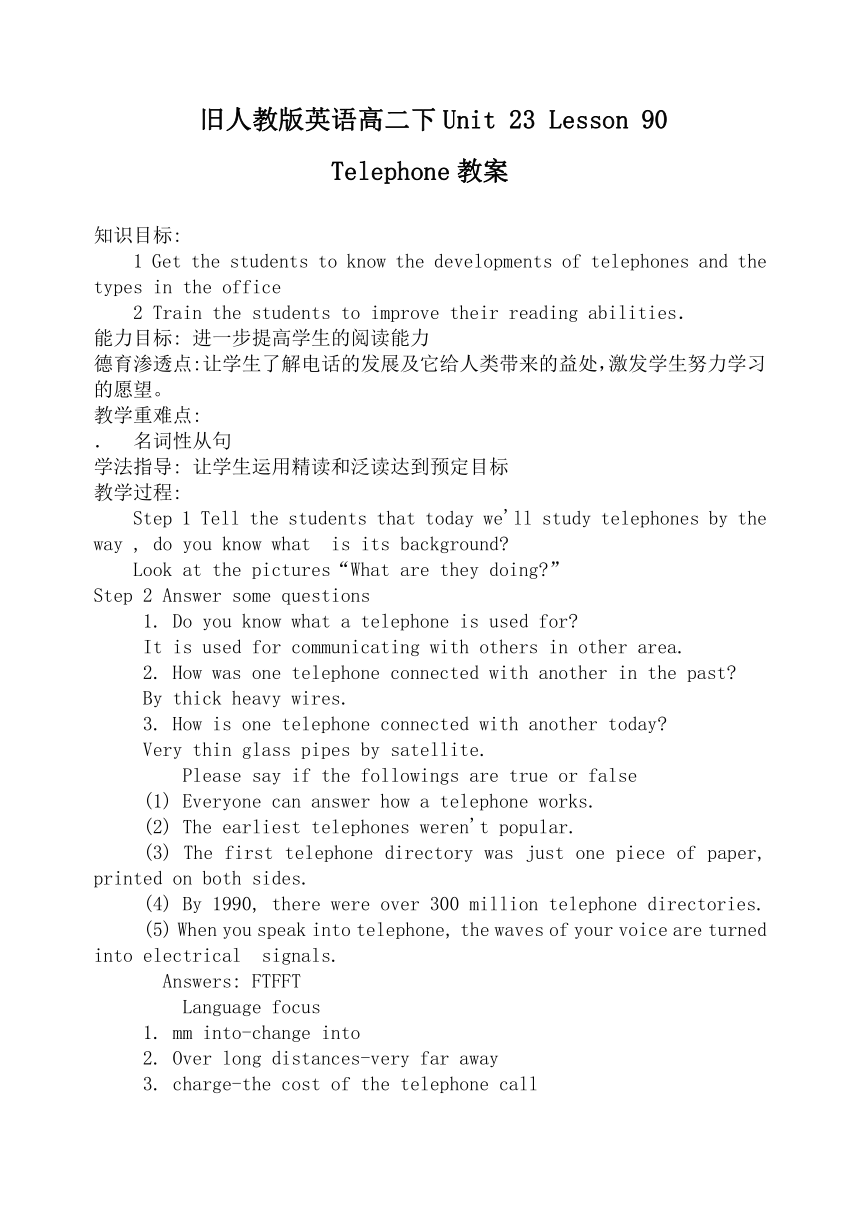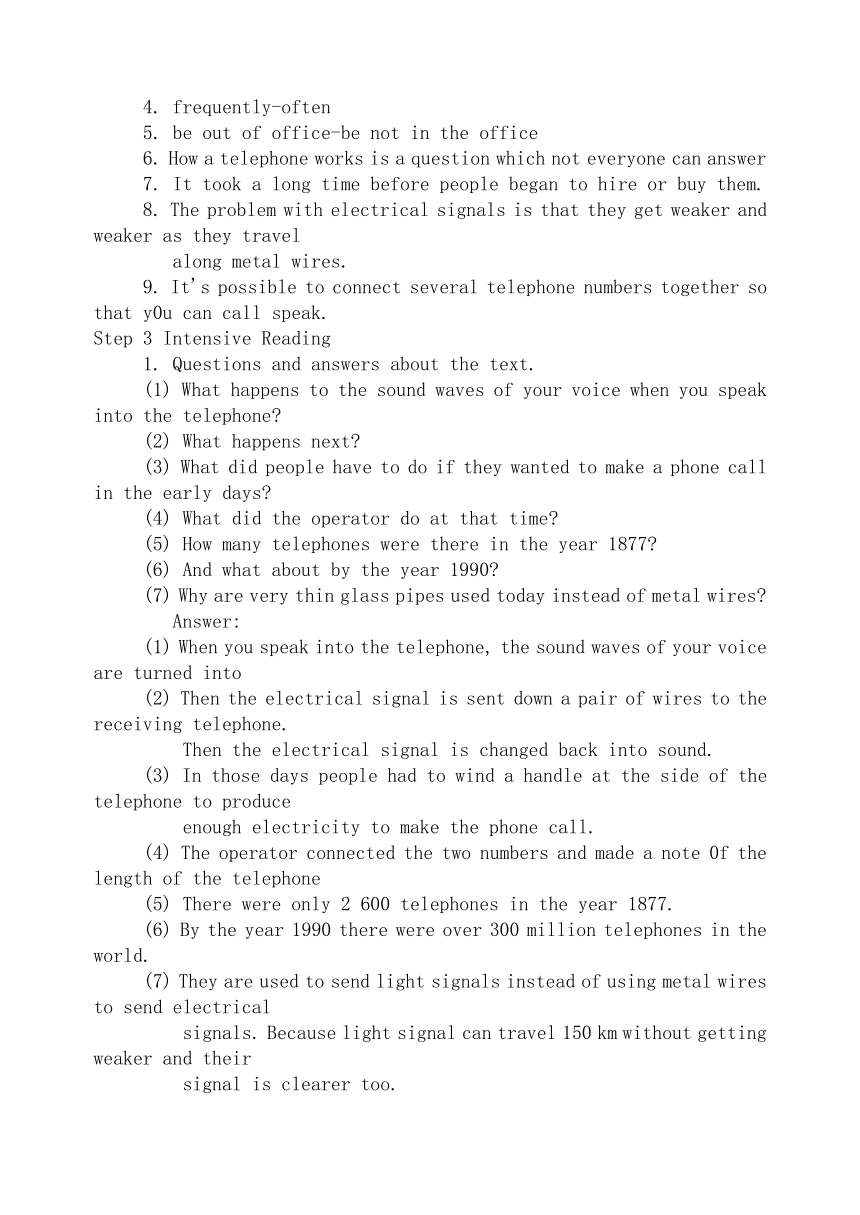高二下Unit 23 Lesson 90 Telephone教案[下学期]
文档属性
| 名称 | 高二下Unit 23 Lesson 90 Telephone教案[下学期] |

|
|
| 格式 | rar | ||
| 文件大小 | 6.4KB | ||
| 资源类型 | 教案 | ||
| 版本资源 | 人教版(新课程标准) | ||
| 科目 | 英语 | ||
| 更新时间 | 2006-07-08 00:00:00 | ||
图片预览


文档简介
旧人教版英语高二下Unit 23 Lesson 90
Telephone教案
知识目标:
1 Get the students to know the developments of telephones and the types in the office
2 Train the students to improve their reading abilities.
能力目标: 进一步提高学生的阅读能力
德育渗透点:让学生了解电话的发展及它给人类带来的益处,激发学生努力学习的愿望。
教学重难点:
. 名词性从句
学法指导: 让学生运用精读和泛读达到预定目标
教学过程:
Step 1 Tell the students that today we'll study telephones by the way , do you know what is its background
Look at the pictures“What are they doing ”
Step 2 Answer some questions
1. Do you know what a telephone is used for
It is used for communicating with others in other area.
2. How was one telephone connected with another in the past
By thick heavy wires.
3. How is one telephone connected with another today
Very thin glass pipes by satellite.
Please say if the followings are true or false
(1) Everyone can answer how a telephone works.
(2) The earliest telephones weren't popular.
(3) The first telephone directory was just one piece of paper, printed on both sides.
(4) By 1990, there were over 300 million telephone directories.
(5) When you speak into telephone, the waves of your voice are turned into electrical signals.
Answers: FTFFT
Language focus
1. mm into-change into
2. Over long distances-very far away
3. charge-the cost of the telephone call
4. frequently-often
5. be out of office-be not in the office
6. How a telephone works is a question which not everyone can answer
7. It took a long time before people began to hire or buy them.
8. The problem with electrical signals is that they get weaker and weaker as they travel
along metal wires.
9. It's possible to connect several telephone numbers together so that y0u can call speak.
Step 3 Intensive Reading
1. Questions and answers about the text.
(1) What happens to the sound waves of your voice when you speak into the telephone
(2) What happens next
(3) What did people have to do if they wanted to make a phone call in the early days
(4) What did the operator do at that time
(5) How many telephones were there in the year 1877
(6) And what about by the year 1990
(7) Why are very thin glass pipes used today instead of metal wires
Answer:
(1) When you speak into the telephone, the sound waves of your voice are turned into
(2) Then the electrical signal is sent down a pair of wires to the receiving telephone.
Then the electrical signal is changed back into sound.
(3) In those days people had to wind a handle at the side of the telephone to produce
enough electricity to make the phone call.
(4) The operator connected the two numbers and made a note 0f the length of the telephone
(5) There were only 2 600 telephones in the year 1877.
(6) By the year 1990 there were over 300 million telephones in the world.
(7) They are used to send light signals instead of using metal wires to send electrical
signals. Because light signal can travel 150 km without getting weaker and their
signal is clearer too.
Step 4 Main idea of the text
Part 1 (Paragraph I)
How a telephone works.
Part 2 (Paragraphs 2 ~ 3)
The history of telephone.
Part 3 (Paragraphs 4 ~ 5)
The development of telephone. The telephone in the office. Different types of telephone and the different uses of them.
step 5 Discuss in pairs
1. Compared with a common telephone, what advantages does a mobile phone have
Step 6 More vocabulary about telephone
sound waves; electrical signals; a pair of wires; wind a handle at the side of the telephone; operate; length of the telephone call and the charge; the first
telephone directory; telephone equipment; radio; light signals; metal wires;
light wires; very thin glass pipes; conference calling; dialing; redirection;
call waiting; mobile phones; a cordless phone, etc.
Step 7 Homework
1. Retell the text.
2. Finish off the exercises in the WB
step8 Exercises: Fill in the blacks with the phrases given below, change the form
if necessary.
have a word with, be due to, ring off, have on, all the best, in other words in the last ten years, look up, be changed into, free of charge
1.The next meeting _____be held in three weeks' time.
2.On Sundays, the children often ____their new clothes.
3.He said to me that the service would be done_____, but later he charged me
twenty yuan.
4. ____in your study.
5.I soon found that the work I was doing had already been done by someone else. ____ , I was wasting my time.
6. While reading, you don't need to _____every new word.
7. The light signals can _____ electrical signals and finally sound.
8. ____there have been great changes in the town.
9. I have to____ now. Someone is waiting to use the phone.
10. I'd like to____ her about the teaching.
Answers:
1.is due to 2.have on 3.free of charge
4.All the best 5.In other words 6.look up
7.be changed into 8.In the last years 9.ring off
10.have a word with
Step 8
Record after Teaching
Telephone教案
知识目标:
1 Get the students to know the developments of telephones and the types in the office
2 Train the students to improve their reading abilities.
能力目标: 进一步提高学生的阅读能力
德育渗透点:让学生了解电话的发展及它给人类带来的益处,激发学生努力学习的愿望。
教学重难点:
. 名词性从句
学法指导: 让学生运用精读和泛读达到预定目标
教学过程:
Step 1 Tell the students that today we'll study telephones by the way , do you know what is its background
Look at the pictures“What are they doing ”
Step 2 Answer some questions
1. Do you know what a telephone is used for
It is used for communicating with others in other area.
2. How was one telephone connected with another in the past
By thick heavy wires.
3. How is one telephone connected with another today
Very thin glass pipes by satellite.
Please say if the followings are true or false
(1) Everyone can answer how a telephone works.
(2) The earliest telephones weren't popular.
(3) The first telephone directory was just one piece of paper, printed on both sides.
(4) By 1990, there were over 300 million telephone directories.
(5) When you speak into telephone, the waves of your voice are turned into electrical signals.
Answers: FTFFT
Language focus
1. mm into-change into
2. Over long distances-very far away
3. charge-the cost of the telephone call
4. frequently-often
5. be out of office-be not in the office
6. How a telephone works is a question which not everyone can answer
7. It took a long time before people began to hire or buy them.
8. The problem with electrical signals is that they get weaker and weaker as they travel
along metal wires.
9. It's possible to connect several telephone numbers together so that y0u can call speak.
Step 3 Intensive Reading
1. Questions and answers about the text.
(1) What happens to the sound waves of your voice when you speak into the telephone
(2) What happens next
(3) What did people have to do if they wanted to make a phone call in the early days
(4) What did the operator do at that time
(5) How many telephones were there in the year 1877
(6) And what about by the year 1990
(7) Why are very thin glass pipes used today instead of metal wires
Answer:
(1) When you speak into the telephone, the sound waves of your voice are turned into
(2) Then the electrical signal is sent down a pair of wires to the receiving telephone.
Then the electrical signal is changed back into sound.
(3) In those days people had to wind a handle at the side of the telephone to produce
enough electricity to make the phone call.
(4) The operator connected the two numbers and made a note 0f the length of the telephone
(5) There were only 2 600 telephones in the year 1877.
(6) By the year 1990 there were over 300 million telephones in the world.
(7) They are used to send light signals instead of using metal wires to send electrical
signals. Because light signal can travel 150 km without getting weaker and their
signal is clearer too.
Step 4 Main idea of the text
Part 1 (Paragraph I)
How a telephone works.
Part 2 (Paragraphs 2 ~ 3)
The history of telephone.
Part 3 (Paragraphs 4 ~ 5)
The development of telephone. The telephone in the office. Different types of telephone and the different uses of them.
step 5 Discuss in pairs
1. Compared with a common telephone, what advantages does a mobile phone have
Step 6 More vocabulary about telephone
sound waves; electrical signals; a pair of wires; wind a handle at the side of the telephone; operate; length of the telephone call and the charge; the first
telephone directory; telephone equipment; radio; light signals; metal wires;
light wires; very thin glass pipes; conference calling; dialing; redirection;
call waiting; mobile phones; a cordless phone, etc.
Step 7 Homework
1. Retell the text.
2. Finish off the exercises in the WB
step8 Exercises: Fill in the blacks with the phrases given below, change the form
if necessary.
have a word with, be due to, ring off, have on, all the best, in other words in the last ten years, look up, be changed into, free of charge
1.The next meeting _____be held in three weeks' time.
2.On Sundays, the children often ____their new clothes.
3.He said to me that the service would be done_____, but later he charged me
twenty yuan.
4. ____in your study.
5.I soon found that the work I was doing had already been done by someone else. ____ , I was wasting my time.
6. While reading, you don't need to _____every new word.
7. The light signals can _____ electrical signals and finally sound.
8. ____there have been great changes in the town.
9. I have to____ now. Someone is waiting to use the phone.
10. I'd like to____ her about the teaching.
Answers:
1.is due to 2.have on 3.free of charge
4.All the best 5.In other words 6.look up
7.be changed into 8.In the last years 9.ring off
10.have a word with
Step 8
Record after Teaching
